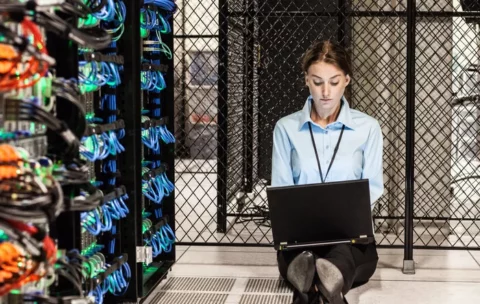Filter by Topic
Filter by Vendor
CompTIA Cloud Essentials+ eLearning Bundle
CertMaster Learn Details What is CertMaster Learn? CertMaster Learn is …
CompTIA Network+ eLearning Bundle
What is CertMaster Practice? CompTIA CertMaster Practice is an online …
CompTIA Security+ eLearning Bundle
CertMaster Learn Details What is CertMaster Learn? CertMaster Learn is …
Cisco CCNA: Implementing and Administering Cisco Solutions eLearning
Course Description The Implementing and Administering Cisco Solutions (CCNA) course …
What you'll learn
Describe network fundamentals and build simple LANs
Understand routing operations and configuration
Manage network device security
Expand small to medium-sized networks with WAN connectivity
Demonstrate IPv4 and IPv6 basics
ITIL® 4 Foundation eLearning
Course Description This exciting and dynamic online training course provides …
What you'll learn
Key IT service management concepts
How ITIL guiding principles can help and organization to adopt and adapt service management
The 4 dimensions of service management
The purpose and components of the service value system
The activities of the service value chain and how they interconnect
Know the purpose of key ITIL practices
Certified Network Defender | CND
Course Description Certified Network Defender (CND) is a vendor-neutral, hands-on, …
CompTIA Cybersecurity Analyst (CySA+)
Participate in The High-Stake Cyber-Security Analyst Certification Course By participating …
What you'll learn
Assess information security risk in computing and network environments.
Analyze reconnaissance threats to computing and network environments.
Analyze attacks on computing and network environments.
Analyze post-attack techniques on computing and network environments.
Implement a vulnerability management program.
Collect cybersecurity intelligence.
Analyze data collected from security and event logs.
Perform active analysis on assets and networks.
Respond to cybersecurity incidents.
Investigate cybersecurity incidents.
Address security issues with the organization’s technology architecture.
Computer Hacking Forensic Investigator | CHFI
Course Description The Computer Hacking Forensic Investigator (CHFI) course delivers …
What you'll learn
Establish threat intelligence and key learning points to support pro-active profiling and scenario modeling
Perform anti-forensic methods detection
Perform post-intrusion analysis of electronic and digital media to determine the who, where, what, when, and how the intrusion occurred
Extract and analyze of logs from various devices like proxy, firewall, IPS, IDS, Desktop, laptop, servers, SIM tool, router, firewall, switches AD server, DHCP logs, Access Control Logs & conclude as part of investigation process.
Identify & check the possible source / incident origin.
Recover deleted files and partitions in Windows, Mac OS X, and Linux
Conduct reverse engineering for known and suspected malware files
Collect data using forensic technology methods in accordance with evidence handling procedures, including collection of hard copy and electronic documents
The computer forensic investigation process and the various legal issues involved
Evidence searching, seizing, and acquisition methodologies in a legal and forensically sound manner
Types of digital evidence, rules of evidence, digital evidence examination process, and electronic crime and digital evidence consideration by crime category
Roles of the first responder, first responder toolkit, securing and evaluating electronic crime scene, conducting preliminary interviews, documenting electronic crime scene, collecting and preserving electronic evidence, packaging and transporting electronic evidence, and reporting the crime scene
Setting up a computer forensics lab and the tools involved in it
Various file systems and how to boot a disk
Gathering volatile and non-volatile information from Windows
Data acquisition and duplication rules
Validation methods and tools required
Recovering deleted files and deleted partitions in Windows, Mac OS X, and Linux
Forensic investigation using AccessData FTK and EnCase
Steganography and its techniques
Steganalysis and image file forensics
Password cracking concepts, tools, and types of password attacks
Investigating password protected files
Types of log capturing, log management, time synchronization, and log capturing tools
Investigating logs, network traffic, wireless attacks, and web attacks
Tracking emails and investigating email crimes
Mobile forensics and mobile forensics software and hardware tools
Writing investigative reports
Dark Web Forensics and IOT Forensics










